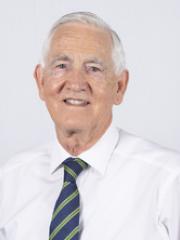Emeritus Professor Michael Pender

Researcher biography
Emeritus Professor Michael Pender graduated from The University of Queensland in 1974 with First Class Honours in Medicine and a University Medal. Over the next six years he trained as a physician and neurologist at the Royal Prince Alfred Hospital and St Vincent's Hospital, Sydney, and became a Fellow of the Royal Australasian College of Physicians (FRACP) in 1981. During his specialist clinical training he developed a keen interest in multiple sclerosis which he has continued since then. After completing his clinical training in neurology, he was a research scholar in the field of multiple sclerosis at the Institute of Neurology, Queen Square, London, and was awarded a PhD from the University of London and Queen Square Prize for Research in 1983. From 1984 to 1986 he continued this research as a Research Fellow at the John Curtin School of Medical Research, Australian National University, Canberra. In 1987 he was appointed Senior Lecturer in the Department of Medicine, The University of Queensland, at the Royal Brisbane Hospital. In 1989 he was awarded a Doctorate of Medicine from The University of Queensland for his research in the field of multiple sclerosis and was promoted to Reader in Medicine. In 1995 he was promoted to Professor of Medicine (Personal Chair), The University of Queensland, which he held until his retirement in 2021. His main clinical and research interest is multiple sclerosis. He also held the positions of: Consultant Neurologist, Royal Brisbane and Women's Hospital, 1987–2021; Director of Neurology, Royal Brisbane and Women's Hospital, 1992–2005: Director of the Neuroimmunology Research Centre, The University of Queensland, 1991–2007; Director of the Multiple Sclerosis Research Centre, The University of Queensland, 2009–2014; and Clinical Fellow, QIMR Berghofer Medical Research Institute, 2017–2021. In 1996, with the support of the Multiple Sclerosis Society of Queensland, he established a Multiple Sclerosis Clinic at the Royal Brisbane and Women's Hospital. In 2006 he was awarded the Multiple Sclerosis Australia Prize for Multiple Sclerosis Research - "For outstanding commitment and dedication to research into the cause and cure of Multiple Sclerosis in Australia". In 2011 he received the John H Tyrer Prize in Internal Medicine, The University of Queensland, for research in the field of Internal Medicine. He was the Sir Raphael Cilento Orator of the Royal Australasian College of Medical Administrators for 2009 and the W Ian McDonald Lecturer of the Australian and New Zealand Association of Neurologists for 2014. In 2019 he received the John Studdy Award from Multiple Sclerosis Australia for "lifelong commitment and service to research to identify the cause of and potential cure for Multiple Sclerosis". In 2024 he was appointed a Member of the Order of Australia for significant service to medicine, particularly neurology and multiple sclerosis research, and to tertiary education. Major research achievements include: the discovery of apoptosis of autoreactive T cells in the central nervous system as a fundamental mechanism of recovery from autoimmune attack (Journal of the Neurological Sciences 1991, Journal of Autoimmunity 1992, European Journal of Immunology 1994); formulation of a novel hypothesis (The Lancet 1998) proposing a failure of this mechanism in multiple sclerosis; and the further development of this hypothesis into a new paradigm (Trends in Immunology 2003) for the cause of human chronic autoimmune diseases based on infection of autoreactive B cells with the Epstein–Barr virus (EBV), some of the predictions of which have already been verified in multiple sclerosis, rheumatoid arthritis and Sjögren's syndrome. His EBV hypothesis led to the first clinical trial of EBV-specific T cell therapy in multiple sclerosis (JCI Insight 2018), a trial in which he was a principal investigator.
Group page: https://medicine-program.uq.edu.au/multiple-sclerosis-research-group
